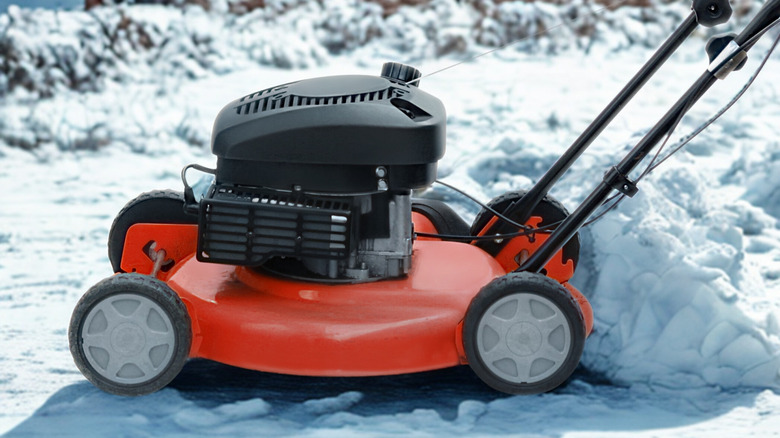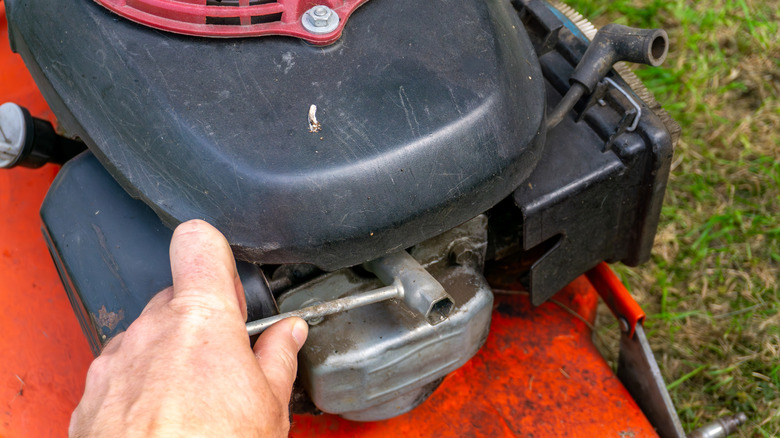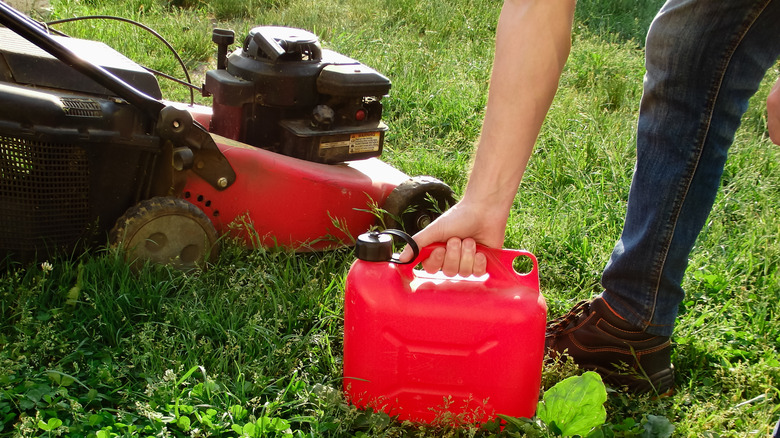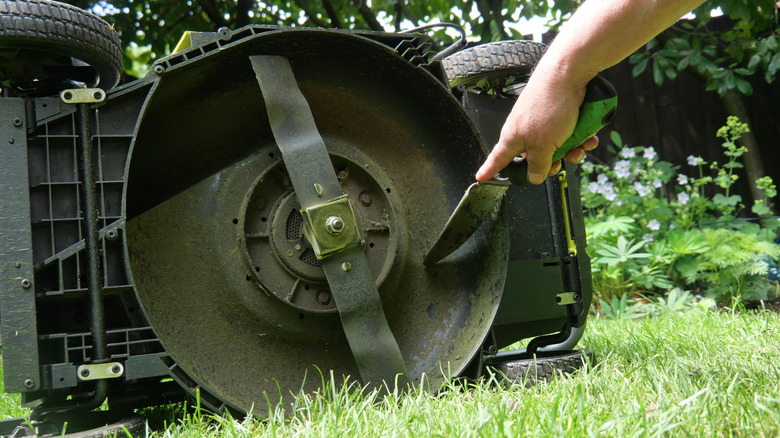3 Steps You Need To Take To Properly Prepare Your Lawn Mower For Winter
We may receive a commission on purchases made from links.
When winter approaches, it means one's outdoor habits are about to change drastically. The rake and leaf blower are about to be retired in favor of the shovel and snowblower, driveways may need salting as ice forms, and if you have a camper or RV, it'll need to be winterized properly to survive the season. Additionally, all the lawn equipment you used throughout the summer, fall, and will need again in the spring, such as your lawn mower, should be put away correctly. This way, they'll be ready to go once the weather warms up in a few months.
When it comes to proper winter lawn mower storage, there are some self-explanatory steps to take. You want to store your mower indoors, like in a garage or shed, to keep snow and ice from getting the better of it. It's also a good idea to cover it, again, to defend it from the elements. With that said, storage is the bare minimum one can do to keep their lawn mower safe and springtime-ready as winter takes hold.
There are a host of other steps to get done once the mowing season is over, lest you have to buy a new mower next season or get some costly repairs done. Beyond the specifics of storage, lawn mower winterizing isn't too involved, nor is it expensive or time-consuming. Here are the big steps to take care of ahead of the frigid off-season.
General maintenance tasks are musts
Getting right into lawn mower winter prep, you want to take a proactive approach. In this case, that means handling the maintenance tasks that will make getting back into the swing of lawn care in the spring that much easier. Starting out relatively simple, you should empty your mower's oil and replace it with a fresh batch. Drain the old stuff, pour in the new, let the engine run for a few minutes to move it around, and you're good.
Don't forget to use the right kind, too, since not all lawn mowers use the same engine oil. Moving on to another fluid check, it's a good idea to relubricate any elements that require greasing. Add your chosen form of lubrication to moving parts that need it, test their motion, and reapply until they're moving fluidly.
From here, there are whole parts that you should replace, repair, or remove before winter. The air filter is one such part, as throughout the mowing season, it's guaranteed to fill with dirt and dust. This restricts airflow, forcing the mower to work harder and, therefore, put extra stress on the engine that can lead to damage. Paper filters can be replaced entirely, while foam ones can do with a good washing using warm water and soap. It's recommended that you replace the spark plugs as well, ensuring easier starting next season, and replace or at least sharpen your mower blades for more efficient cutting. The battery should also be removed, cleaned, and stored in a cool, dry place.
Don't forget to take care of the gas tank
While taking care of your lawn mower's oil is important, it's not the only key fluid that needs to be addressed before winter. The gasoline that powers your mower can't be ignored either, or else it could do serious harm and give you equally serious headaches. Gasoline expires after a time, going from a thick liquid to a sticky, solidified mass that gums up the inner-workings of the machine it's in. It can corrode and jam your mower, making it difficult or potentially impossible to get working again. Fortunately, to combat this issue, there are a couple of routes you can take that can be done in a matter of minutes.
For this step, you can run your mower's engine until it's out of gasoline, or pour out whatever is left in the tank. All this requires is a container to allow the remaining fuel to drain into, which will pour out from the gas line once it's carefully disconnected. If need be, properly dispose of the remaining gasoline you've drained.
If you don't want to go with this option, you can do the opposite by adding to your gas tank rather than removing fluid from it. Fuel stabilizer is a compound designed to keep gas fresh throughout periods of prolonged storage. Fill up the tank, add in the correct type of stabilizer — such as STA-BIL Storage Fuel Stabilizer, for example — in the recommended quantity, run the engine to distribute it, and turn the engine off when done. This will keep the gas within usable come springtime.
A good cleaning goes a long way
Throughout the lawn mowing season, it's pretty much a given that your mower is going to get nasty. Dirt, leaves, grass clippings, and more are all but guaranteed to accumulate. Such is the cost of having a freshly trimmed lawn. Ideally, every time you get done mowing, you're already cleaning out your mower, but if not — one of several mistakes everyone makes with their lawn mower — it's definitely a habit worth getting into. Most importantly, it should be cleaned from top to bottom before winter storage. Use a rag or even a sponge to remove stuck-on dirt, a scraper to yank off caked dirt and grass from the underside, and, in the case of riding lawn mowers, even hose out the tire treads to get rid of lingering debris.
This may seem like a purely aesthetic step in your winterizing journey, but there's far more to it that the mere look of your mower. Over time, debris can actually do harm to your mower, with the off-season presenting a perfect opportunity for things to go wrong. Stuck on, grass and dirt can retain moisture, creating the perfect environment for rust to form and damage the structural integrity of your mower. The presence of debris internally can damage the mower over time as well, reducing its efficiency and overall lifespan.
Additionally, it's a good idea to treat lingering oil stains with degreaser. Spray on something like the WD-40 Specialist Machine & Engine Degreaser Foaming Spray and wipe it off after the recommended waiting period. With your mower clean, spray the metal components with your preferred anti-corrosion solution, and you'll be set to go. At this point, internally and externally, your lawn mower is now winter storage ready.



